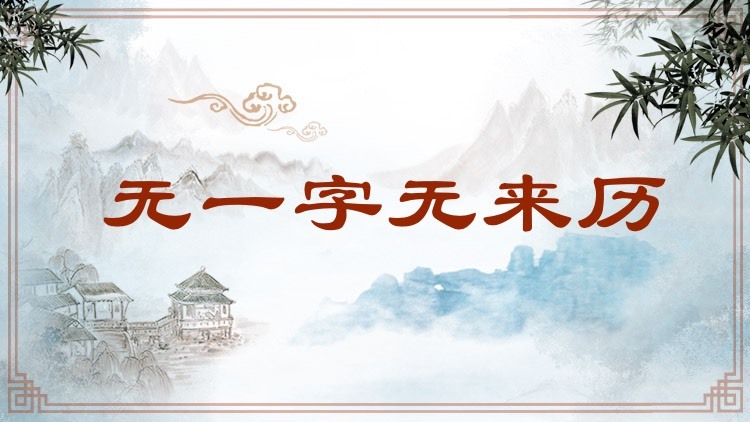无一字无来历
No Word Is Without a Source

作品中凡是独创性的表达都能在前人作品中追溯到源头。黄庭坚(1045—1105)此语揭示了文学的继承性或者说“文本间性”, 指出文学上的独创要以广泛阅读前人的作品为基础,同时要“点铁成金”, 善于化用前人作品中的字句或意旨。创作上的继承或源流关系一般体现为作品中的用典和对前人词句、意象等的化用,但又不能片面追求援引前人的词句、意象,亦步亦趋,落入复古主义的窠臼。此语还表明文学接受也是需要溯本追源的。
All creative literary expressions draw on works of earlier writers. This concept, put forward by Huang Tingjian (1045-1105), points to what is known as inheritance or intertextuality of literature, stating that literary creativity should be based on extensive reading of works of earlier writers. At the same time, one should turn iron into gold by making creative use of the expressions and meanings of such works. The relationship between inheritance and origin in works is generally reflected in the use of allusions and the adaptation of expressions, phrases and imagery from earlier works. However, one should not just quote expressions, phrases and imagery from these works, nor blindly copy them, so as not to fall into the trap of retrogression. This concept also highlights the need to trace the origin in appreciating literary works.
引例 Citations:
◎自作语最难,老杜作诗,退之作文,无一字无来处。(黄庭坚《答洪驹父(fǔ)书》)
自己创造词句是最难的,杜甫写诗,韩愈写文章,没有一个字没有出处。
Creating your own expressions and phrases is most demanding. In Du Fu's poems and Han Yu's essays, there is not a single word that is without a source. (Huang Tingjian: A Letter of Response to Hong Jufu)
◎然予观宋景文近体,无一字无来历。而对仗精确,非读万卷者不能,迥非南渡以后所及。(王士禛《香祖笔记》卷十)
然而我看宋祁的近体诗作,没有一个字没有出处。而且对仗精工,如果不是读过很多书是做不到的,远非南渡之后的文人所能企及。
However, I can see that not a single word in Song Qi's modern-style poems is without an original source. His poems are so well-crafted and balanced in structure, which shows that he could not have written them if he had not read a lot of books, and his poems are far beyond the ability of the literati of the Song Dynasty after it moved south. (Wang Shizhen: Notes from the Orchid Studio)
推荐:教育部 国家语委
供稿:北京外国语大学 外语教学与研究出版社
责任编辑:钱耐安





